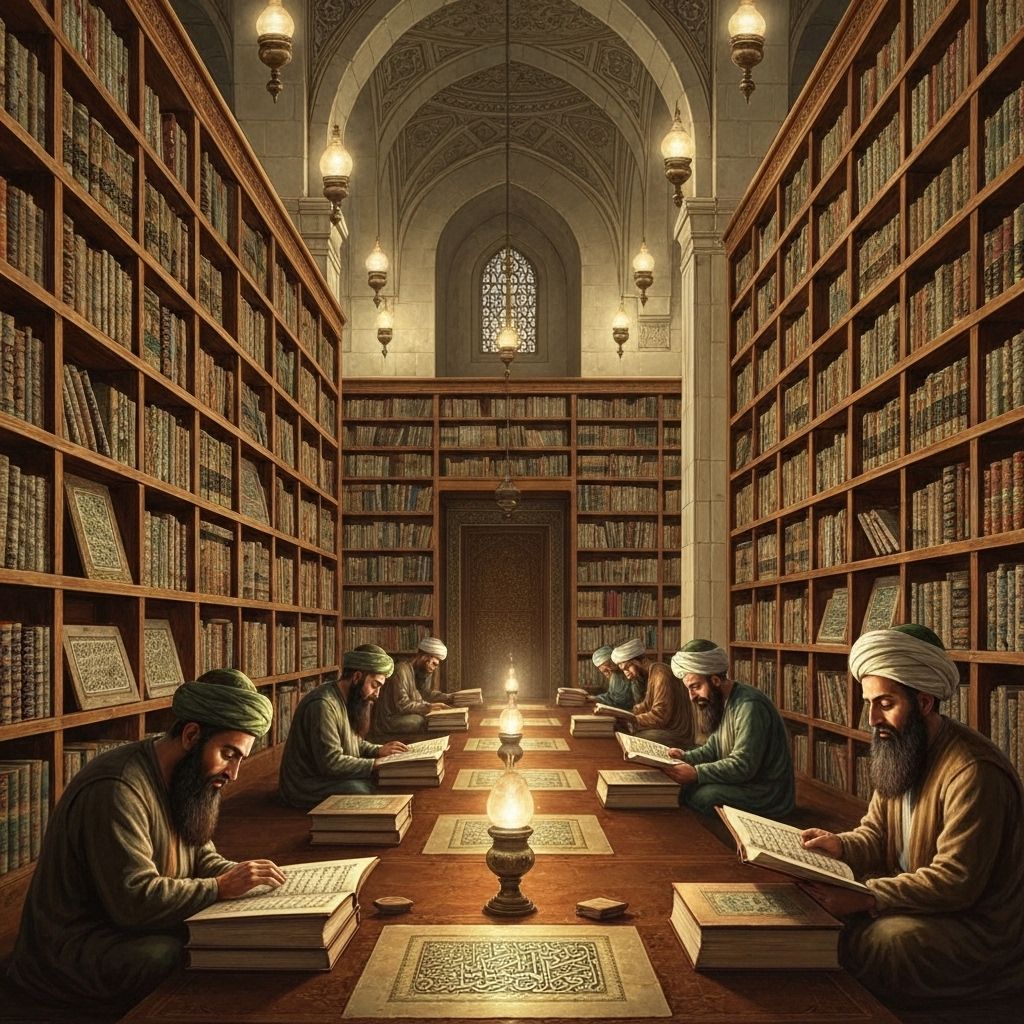
Islamic Golden Age of Science
Great Muslim Scientists
Discover the remarkable contributions of Muslim scholars who shaped our understanding of science, mathematics, medicine, and philosophy during the Islamic Golden Age.
Al-Khwarizmi
780-850 CE
Baghdad, Iraq
Mathematics & AstronomyKey Achievements:
- Father of Algebra
- Introduced Hindu-Arabic numerals to Europe
- Developed systematic solutions for linear and quadratic equations
Ibn Sina (Avicenna)
980-1037 CE
Persia
Medicine & PhilosophyKey Achievements:
- Wrote 'The Canon of Medicine'
- Pioneered experimental medicine
- Contributed to philosophy and natural sciences
Al-Razi (Rhazes)
854-925 CE
Ray, Persia
Medicine & ChemistryKey Achievements:
- Distinguished smallpox from measles
- Pioneer of pediatrics and obstetrics
- Developed medical ethics
Ibn al-Haytham (Alhazen)
965-1040 CE
Basra, Iraq
Optics & PhysicsKey Achievements:
- Father of modern optics
- Developed scientific method
- Explained vision and light behavior
Al-Biruni
973-1048 CE
Khwarezm, Uzbekistan
Astronomy & GeographyKey Achievements:
- Calculated Earth's circumference
- Pioneer of comparative religion
- Advanced trigonometry and astronomy
Ibn Rushd (Averroes)
1126-1198 CE
Cordoba, Spain
Philosophy & MedicineKey Achievements:
- Commentaries on Aristotle
- Reconciled reason and faith
- Advanced medical knowledge
Al-Kindi
801-873 CE
Kufa, Iraq
Philosophy & MathematicsKey Achievements:
- First Arab philosopher
- Translated Greek works
- Contributed to cryptography
Ibn Khaldun
1332-1406 CE
Tunisia
Sociology & HistoryKey Achievements:
- Father of sociology
- Developed economic theories
- Wrote 'Muqaddimah'
Al-Jazari
1136-1206 CE
Mesopotamia
Engineering & MechanicsKey Achievements:
- Father of robotics
- Invented mechanical devices
- Advanced hydraulic engineering
Ibn Battuta
1304-1368 CE
Tangier, Morocco
Geography & TravelKey Achievements:
- Greatest medieval traveler
- Documented cultures and geography
- Traveled over 75,000 miles
Al-Farabi
872-950 CE
Kazakhstan
Philosophy & MusicKey Achievements:
- Second Teacher after Aristotle
- Political philosophy
- Music theory and instruments
Ibn al-Nafis
1213-1288 CE
Damascus, Syria
Medicine & AnatomyKey Achievements:
- Discovered pulmonary circulation
- Advanced anatomy knowledge
- Wrote medical commentaries
Al-Ghazali
1058-1111 CE
Tus, Persia
Theology & PhilosophyKey Achievements:
- Reconciled Sufism with orthodoxy
- Critiqued philosophy
- Wrote 'Revival of Religious Sciences'
Omar Khayyam
1048-1131 CE
Nishapur, Persia
Mathematics & AstronomyKey Achievements:
- Advanced algebra and geometry
- Reformed the calendar
- Famous poet and philosopher
Al-Battani
858-929 CE
Harran, Turkey
Astronomy & MathematicsKey Achievements:
- Refined astronomical measurements
- Corrected Ptolemy's calculations
- Advanced trigonometry
Ibn Tufail
1105-1185 CE
Guadix, Spain
Philosophy & MedicineKey Achievements:
- Wrote 'Hayy ibn Yaqzan'
- Philosophical novel pioneer
- Court physician and philosopher
Al-Idrisi
1100-1165 CE
Sicily, Italy
Geography & CartographyKey Achievements:
- Created detailed world map
- Advanced geographical knowledge
- Wrote 'Tabula Rogeriana'
Ibn Zuhr (Avenzoar)
1094-1162 CE
Seville, Spain
Medicine & SurgeryKey Achievements:
- Pioneer of experimental surgery
- Described parasitic diseases
- Advanced medical practice
Al-Zahrawi (Albucasis)
936-1013 CE
Cordoba, Spain
Surgery & MedicineKey Achievements:
- Father of modern surgery
- Invented surgical instruments
- Wrote 'Al-Tasrif'
Jabir ibn Hayyan
721-815 CE
Kufa, Iraq
Chemistry & AlchemyKey Achievements:
- Father of chemistry
- Developed laboratory techniques
- Discovered several acids
Al-Mas'udi
896-956 CE
Baghdad, Iraq
History & GeographyKey Achievements:
- Herodotus of the Arabs
- Comprehensive historical works
- Advanced geographical knowledge
Ibn al-Shatir
1304-1375 CE
Damascus, Syria
Astronomy & MathematicsKey Achievements:
- Reformed planetary models
- Influenced Copernicus
- Advanced astronomical instruments
Al-Shirazi
1236-1311 CE
Shiraz, Persia
Astronomy & MedicineKey Achievements:
- Tusi-couple in astronomy
- Medical treatises
- Mathematical innovations
Ibn Qurra
826-901 CE
Harran, Turkey
Mathematics & AstronomyKey Achievements:
- Advanced number theory
- Translated Greek works
- Contributed to geometry
Al-Karkhi
953-1029 CE
Baghdad, Iraq
Mathematics & EngineeringKey Achievements:
- Advanced algebra
- Hydraulic engineering
- Mathematical proofs
Ibn Bajjah (Avempace)
1095-1138 CE
Zaragoza, Spain
Philosophy & PhysicsKey Achievements:
- Theory of motion
- Philosophical works
- Influenced later scholars
Al-Umawi
1200-1262 CE
Damascus, Syria
Botany & MedicineKey Achievements:
- Advanced botanical studies
- Medical applications of plants
- Pharmaceutical knowledge
Ibn al-Baitar
1197-1248 CE
Malaga, Spain
Botany & PharmacyKey Achievements:
- Greatest botanist of Middle Ages
- Comprehensive plant encyclopedia
- Advanced pharmaceutical knowledge
Al-Dinawari
828-896 CE
Dinavar, Persia
Botany & HistoryKey Achievements:
- Father of Arabic botany
- Comprehensive plant studies
- Historical chronicles
Ibn Sina al-Balkhi
850-934 CE
Balkh, Afghanistan
Geography & PsychologyKey Achievements:
- Early psychological studies
- Geographical works
- Mental health concepts
Fatima al-Fihri
800-880 CE
Fez, Morocco
Education & ArchitectureKey Achievements:
- Founded world's oldest university
- Established Al-Qarawiyyin
- Pioneer in higher education for women
Sutayta al-Mahmali
10th Century CE
Baghdad, Iraq
Mathematics & PoetryKey Achievements:
- Expert mathematician and poet
- Solved complex mathematical problems
- Prominent scholar in Islamic Golden Age
Lubna of Cordoba
10th Century CE
Cordoba, Spain
Mathematics & ScienceKey Achievements:
- Royal palace secretary
- Expert in mathematics
- Preserved ancient manuscripts
Rufaida Al-Aslamia
7th Century CE
Medina, Arabia
Medicine & NursingKey Achievements:
- First female Muslim nurse
- Established first field hospital
- Pioneered medical care for soldiers
Mariam al-Asturlabi
10th Century CE
Aleppo, Syria
Astronomy & EngineeringKey Achievements:
- Expert astrolabe maker
- Advanced astronomical instruments
- Worked in royal observatory
Inspired by Their Legacy?
Explore our courses that connect modern science with Islamic teachings, following in the footsteps of these great scholars.